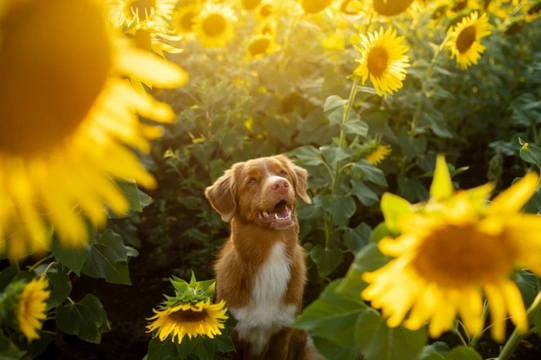
What dog-safe herbs can you plant in your garden at home?
Having a lovely garden and having a dog as well are sometimes mutually exclusive, as many dogs are quite destructive in the garden even if they’re not trying to be – and if your dog likes to dig, pull up flowers, or even just run around a lot and wear a path into the grass, you might be quite limited in what you can do about this.
However, regardless of how tidy or otherwise your garden is or how much access to it your dog has, it is really important to ensure that anything that you bring into the garden or plant in it is safe for your dog.
There are many obvious garden hazards for dogs like pesticides, slug and snail bait, and various plants that are toxic to dogs – and a lot is written about these things to help dog owners to keep their dogs safe.
On the flipside of this, this means that it can be hard to find out what plants are actually safe for dogs – including those that are edible for people. Many of us like to grow our own herbs, but things like garlic and chives are toxic to dogs, which rules them out of being able to be grown safely in reach of a dog.
However, there are quite a number of herbs that are safe for dogs and that can be grown outside in the UK in summer that you can consider instead; and some of them can even be added to your dog’s meals too, as long as you’re sure they haven’t come into contact with pesticides or other chemicals and toxins.
With this in mind, this article will tell you about seven dog-safe herbs you can plant in your garden at home. Read on to learn more.
Rosemary
Rosemary is one of those herbs that is instantly recognisable by its smell, and it makes for a great addition to a tray of roasting potatoes! It is also fairly easy to grow outside in the UK and often grows into large, fragrant bushes that you can harvest from for many months of the year.
If your dog does decide to munch on the plant it won’t cause them any damage at all, and it’s even rich in some of the vitamins dogs need as part of a balanced diet.
Thyme
Thyme is something else that is commonly used to flavour dishes, sometimes being added in a bouquet to stews and the like when cooking but being removed before serving. It also has naturally antimicrobial properties, and is part of the mint family.
Like rosemary, thyme is safe if your dog decides to target it, so is fine to grow in your herb garden.
Parsley
Parsley is really easy to grow and often grows quite prolifically when it gets started, and is most widely used as a garnish. It can also be chewed on its own to help to neutralise the effects of other strong-tasting foods like garlic, and can help to freshen your dog’s breath!
Whilst parsley doesn’t really have a taste that appeals to most dogs, it isn’t dangerous to them and can be planted freely in areas your dog uses.
Oregano
Oregano or marjoram as it was traditionally known in the UK is a really popular herb in Italian cooking, so if you enjoy making pizza or pasta, this is one herb to consider planting before the weather warms up.
Oregano is again safe for dogs, so can be grown freely in a garden that a dog shares or plays in.
Mint
Mint patches can smell delicious, and the leaves give off a strong and enticing aroma when rubbed between your fingers. This is another herb that grows with ease in the UK, and often becomes quite large. Handy to grow and add to buttered boiled potatoes!
Mint is dog-safe, and can even settle stomach upsets if your dog nibbles on it.
Basil
Nothing compares to the smell of fresh basil, and this is something that goes equally well in a salad or sprinkled on top of a pizza.
Basil can be a bit tricky to grow, particularly from seed; most people in the UK start with a baby plant. It is also quite sensitive to the cold and so is usually better grown indoors, or in a greenhouse.
However, if your dog does get into your basil patch or starts munching on a potted basil, it won’t do them any harm.
Coriander
Finally, coriander is one of those herbs that people tend to either love or hate, but it is also very easy to grow and a good addition to a starter herb border in a garden with a dog.
Generally dogs aren’t huge fans of the taste of it, but if they have decided to have a taste or start rolling around in your herb garden, it won’t do them any harm either.



